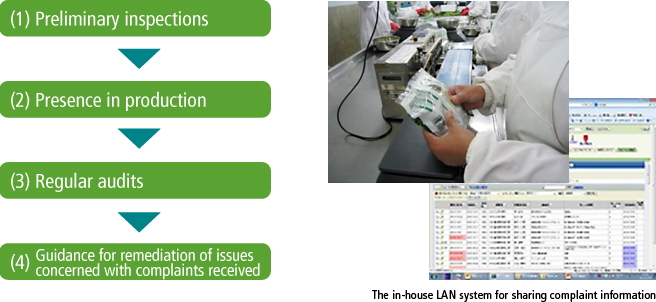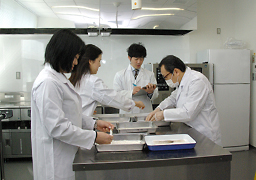
- Home
- >
- Corporate Information
- >
- Quality Management System

- A system of comprehensive quality management that supports food safety and reliability
- Defining food safety and reliability as the top priority in our management vision, we at SOFCO launched a dedicated Quality Assurance Department under the direct control of the president in 2005 to construct a complete quality management system that covers product safety, compliance and employee education.
Quality Management
The Quality Assurance Department engages in operations related to quality management as described below.
- - Compliance
- We implement inspections of proper product labeling to ensure compliance with laws and regulations by quickly and accurately understanding domestic and overseas laws and regulations, including the Food Sanitation Act and the Food Labelling Act, and information on legal revisions.
- - Ensuring product safety
- It shares information on the production plants with the sales team to provide continuous guidance for the improvement of the production plants.
- - Construction of a traceability system
- It works to construct a traceability system that covers residual agricultural chemicals and to otherwise undertake comprehensive management in all processes from raw materials to final products.
- - Rapid response to complaints regarding products
- It has established a complaints communication system with the use of the in-house LAN to respond quickly and appropriately to complaints.
- - Employee education
- It provides education to all employees for the purpose of improving their basic knowledge of food and raising their awareness of safety and compliance.
At the heart of quality management, plant management guidance in Japan and overseas is carried out according to the steps described below to unfailingly ensure product safety.

- (1) Preliminary inspections
- Prior to the start of any new transaction, it carries out preliminary inspections of a wide range of assessment items on equipment and operations, such the production environment, the management of places of origin, inspection systems, and the preparation of documents on product standards.
- (2) Presence in production
- At the initial production, a staff member of the Office is present on site to check whether or not production follows the specifications in all processes from raw material storage to product packing, storage and shipping, and whether or not the appropriate labeling is applied.
- (3) Regular audits
- It conducts regular audits of the shop floor and the production records on the basis of its original checklist in order to identify problems and give guidance for addressing them in an effort to improve the level of plant management.
- (4) Guidance for remediation of issues concerned with complaints received
- It inspects the production plant to probe into the causes of complaints and work out remedial measures for recurrence prevention in collaboration with the plant.
Product development

Our unique quality assurance system set up a professional product development team within the Quality Assurance Department. This embodies SOFCO’s philosophy of developing products based on technical knowledge of quality management, in order to deliver safer, more reliable products.
Our many products are designed in collaboration between this dedicated team and the different sales squads that are more familiar with customers’ needs.
External organization in which we participate to maintain and improve our quality assurance functions
With the goal of gathering information and exchanging opinions to maintain and improve its quality assurance functions, the Office is affiliated with the following external organizations.
◆ Quality Assurance Forum (hosted by the JAPAN FOOD INDUSTRY CLUB)
Quality Assurance Forum was established with the goal of sharing information and knowledge for providing safe and healthy foods to consumers among related government offices, mass retailers, distributors, and food manufacturers, as well as to increase corporate awareness of risk management. Individuals in charge of quality assurance and management at food-related corporations participate in monthly meetings (trainings and sessions for exchanging information), sharing information across organizations.

